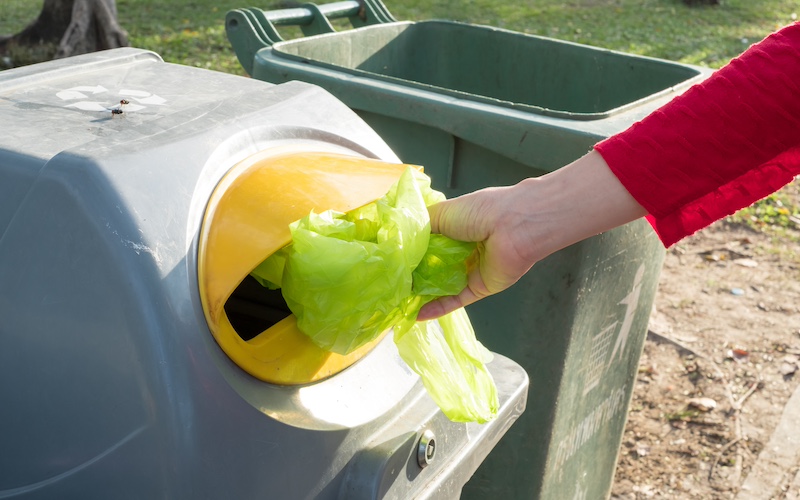
Only a tiny percentage of plastic bags thrown into a recycling bin get recycled. The "recycling" system perpetuates our waste problem and the profits of fossil fuel companies. Photo: Shutterstock
I open our family’s storage closet and stuff a handful of empty bread bags and worn-out old Ziplocs into a larger bag to collect our discarded plastic. My family has been doing this for years: collecting plastic bags and dropping the whole lot at a grocery store to recycle. I always find my father’s badgering about making sure the bags are clean and dry annoying, but I go along with it anyway. After all, my family is doing our part to help keep the planet cleaner, right?
But that’s the problem. Single-use plastic bag recycling seems like the right thing to do, but only a tiny portion of our plastic bags get recycled. Mostly, they end up being incinerated or piled up in landfills, where they slowly break down into microplastics. These tiny pieces of plastic make their way into our air and drinking water, harming our health and the natural landscape. But that’s not what you and I are led to believe. The companies behind the creation of plastic want consumers to think that plastic is being repurposed to make new products. Why? So they can keep profiting. Every year, the average American uses 365 plastic bags – or one every day!
Can You Recycle Plastic Bags?
Technically, you can. But that almost never happens. Correctly recycling plastic is complicated – and that’s by design. Each product has its own directions, all products must be completely free of residues and other trash, and each municipality has its own requirements. Recycling plastic bags is also tricky. Bags can clog up machinery, and sorting bags by color and type of plastic is expensive. That disincentivizes companies from doing it. All these problems reflect the ultimate goal of the fossil fuel companies that manufacture plastic products – to keep the production of plastic going strong.
In the 1970s, consumers started questioning the amount of plastic in their lives, so Big Oil created the scheme of “plastic recycling.” This system was first a PR campaign to retain profits and customers, and it continues today.
To understand how broken the recycling system is, in 2023, ABC News placed 46 trackers in bins across New York state to test where plastic bags dropped at collection sites end up. Only four ended up at facilities that claim to be involved in plastic recycling. Many popped up in landfills or trash incinerators worldwide.
Landfills are an obvious evil, but burning plastic at an incineration plant is just as bad. When plastic is burned, it releases harmful toxins, like BPA (or Bisphenol A) and phthalates, both used in an array of plastic products. BPA appears in most plastics labeled 3-7, like food containers and bottles. Phthalates, common in cosmetic products, help make plastic flexible and durable. Plastic bags labeled numbers 2-4 contain both BPA and phthalates. Using and burning plastics with these chemicals has been linked to premature deaths, neurodevelopment stunting, and hormonal disruption.
Is there a Solution to Plastics?
Many governments worldwide have instituted bag bans to reduce single-use plastic bags. And in the United States, 10 states, including Maine, Rhode Island, and Vermont, have passed plastic bag bans. It’s a great first step, but it won’t truly stem the plastic flow until all states enforce a ban and agree on basic conditions. Unfortunately, right now, each ban varies. Some states allow for thicker plastic bags with the idea that the bags will be reused. The reality, though, is that these bags will become a single-use alternative. Additionally, all states have different definitions of “recyclable” and “single-use” bags.
While bag bans can offer a partial solution, the real solution lies in addressing our plastic problem at its source. And that means holding the companies that continue to push plastic on the public responsible. Across New England, CLF is advocating for Producer Responsibility laws. Such laws would require companies that produce single-use packaging to reimburse states and towns for managing the waste they create.
Going to the grocery store each week, I can’t help but feel utterly helpless. The amount of plastic used in almost every packaged good is disheartening. But there are things you and I can do. We can each reduce our reliance on single-use plastics. We can use our own reusable bags, buy things in bulk, and switch to glass and beeswax to store leftovers. Collectively, we must come together to push local governments to take the plastic crisis as seriously as we do. We must advocate for the passing of bag bans and producer responsibility laws. Working together, we can keep plastics from being a forever pollutant.
William Oehler is a student at Gettysburg College. He served as a Multimedia Marketing and Communications intern at Conservation Law Foundation in the summer of 2024.



